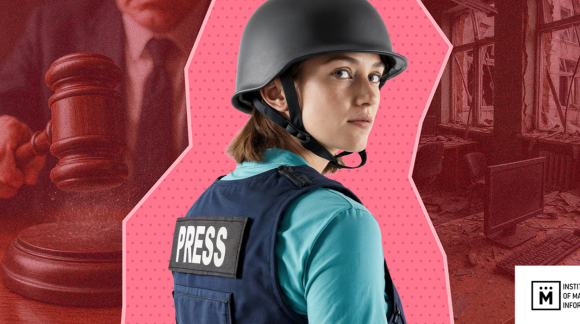Head of the National Union of Journalists of Ukraine Oleh Nalyvayko recently said that half of Ukrainian journalists do not have specialized education and up to 80% of the graduates of department of journalism do not work by profession, ForUm reported.
In his opinion, it is necessary to raise the question of reforming the training of journalists in Ukraine, as well as to strengthen the protection of journalistic rights and journalistic ethics.
ForUm has decided to ask representatives of mass media whether journalism sector of Ukraine needs immediate changes and what defines the quality of training of future correspondents.
Andriy Kulikov, broadcaster:
– I have nothing against journalists, who do not have journalist education. In fact, I am not a journalist by education myself, and I don’t think that education defines a journalist. However, this sphere does require reformation. Our journalists do not have enough practice in the course of education. Students start working too early and do not have enough time to get experience and knowledge they need.
Stanislav Nykolayenko, former education minister of Ukraine:
– I think journalism is well developed in our country. We have good journalists in both web and traditional media. However, the matter concerns professional orientation. Many journalists by education start working but then realize it is not their path. For this, the National Union of Journalists of Ukraine should create youth unions or schools of journalists, where young people can learn the basics of the profession to understand whether they want to continue.
Indeed, the preparation base of journalists must be improved, but only because everything in the world must develop. But in general, I don’t see a problem. It is a common practice when people study one thing, but work somewhere else.
Kateryna Samoilyk, former MP, former secretary of the parliamentary committee on science and education:
– Journalism sector does need reformation. Moreover, the market of journalists must be well studied to work out proper training principles. Every second city now train journalists, who remain non-demanded after graduation, while current journalists do not have specialized education. It is unprofessional and unacceptable. If you want to be a journalist, you must study first. Journalists must be journalists by both vocation and education.
Yegor Benkendorf, director general of the First national channel, honoured worker of culture of Ukraine:
– Any skills and knowledge can be obtained in the process of practicing. Education is welcomed, but not obligatory required. Talent, ambition and readiness to dedicate one’s life to the profession are more important.
Olga Gerasimyuk, former MP, broadcaster:
– Every busybody in town now train journalists, but only few institutions train true professionals. Moreover, journalists do not have enough practice in the course of education. Once I held a master class for fifth grade students, and it turned out they had not been in an editorial office even once. It means that after graduation they are not ready for fieldwork. Besides, teachers and materials they use to train journalists often have nothing to do with the profession.
I am sure that a journalist does not need specialized education, but a lot of knowledge. In my time, for example, economists, historians and even engineers could become journalists. However, without knowledge about the basics of the profession it is impossible to become a good journalist. To write essays or novels and to work as a reporter are two different things.
We also need to pay attention to the fact that when a student asks an editorial office to take him in practice, the latter simply ignores the request. The problem is that editorial offices do not have time and staff to train students for fieldwork.
For this, we need not to reform the information sphere but to create it from the very beginning. The fact is that we do not have national information space. The information space we have is uncontrollable and unpredictable. Media agencies publish messages without references and not caring about interested parties. In fact, this is already a matter of national security. Media agencies do not feel responsible for words they spread, but a word can cause both creation and destruction.
Journalism as the fourth branch of power is weak and unprofessional. It is very sad, because information is one of the important factors of functioning of any society. All negative comments on the quality of our talk shows, programs and news prove that the situation is grave. I don’t know if the National Union of Journalists of Ukraine can improve the situation, but it has a new head now and I wish him the best of luck.
Dmytro Vydrin, publicist, political scientist, President’s aide:
– 79-80% of journalists do not work by profession. My son is graduating the faculty of journalism, and only three or four his classmates work in media sphere. The rest of students are engaged into different activities. In fact, journalism is not among the most demanded professions today. Moreover, in my opinion, the problem is not in bad training, but in poor standards. Employers do not ask much – to cover a scandal, to write about a car accident or a fight. Only a few speak about true journalist investigation. Journalists no longer write feature-stories about people. International journalism is in the lowest demand ever.
In addition, once we had strong moral journalism, but now it is forgotten or has been sacrificed for money. Yesterday I had a talk show with a Hungarian journalist. We talked about the fire in twin towers and media coverage of that event. Journalists had plenty of photos of people jumping out of windows to escape the fire, but they agreed not to publish any of the photos in order not to hurt relatives of people, who died in fire. Journalists were offered big money for those photos, but they refused anyway. Then I asked my guest, would his colleagues, Hungarian journalists, have sold those photos if offered big money, he admitted they would. When I asked Ukrainian journalists the same question adding the price of 100 thousand dollars, they said they would have sold even for one thousand. What can I say? Moral and ethics have gone.
The problem is that employers do not ask for complex genres, while the society does ask for moral articles.




